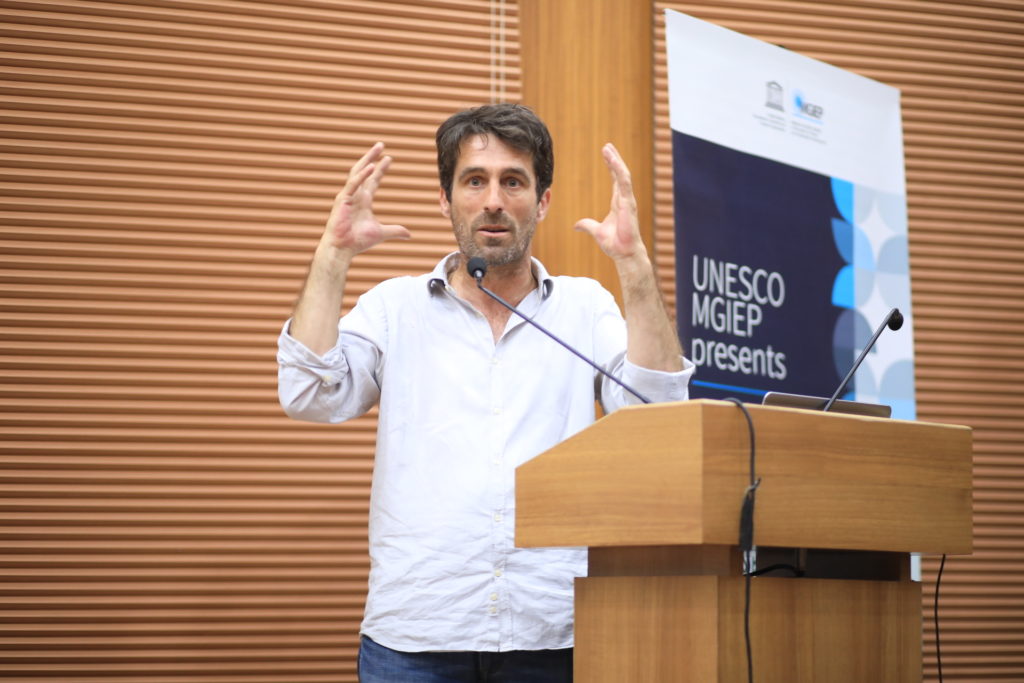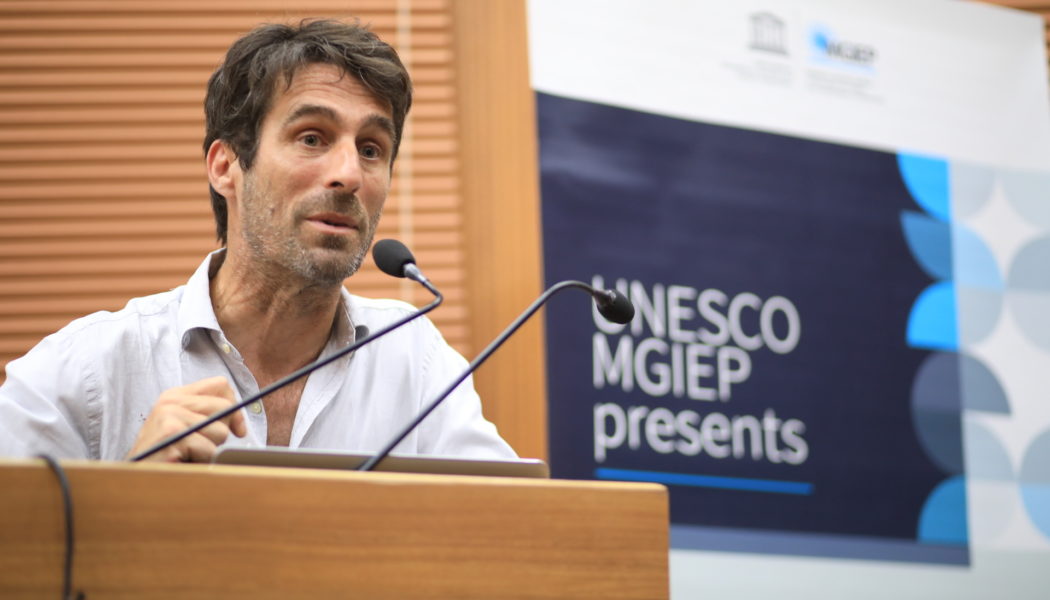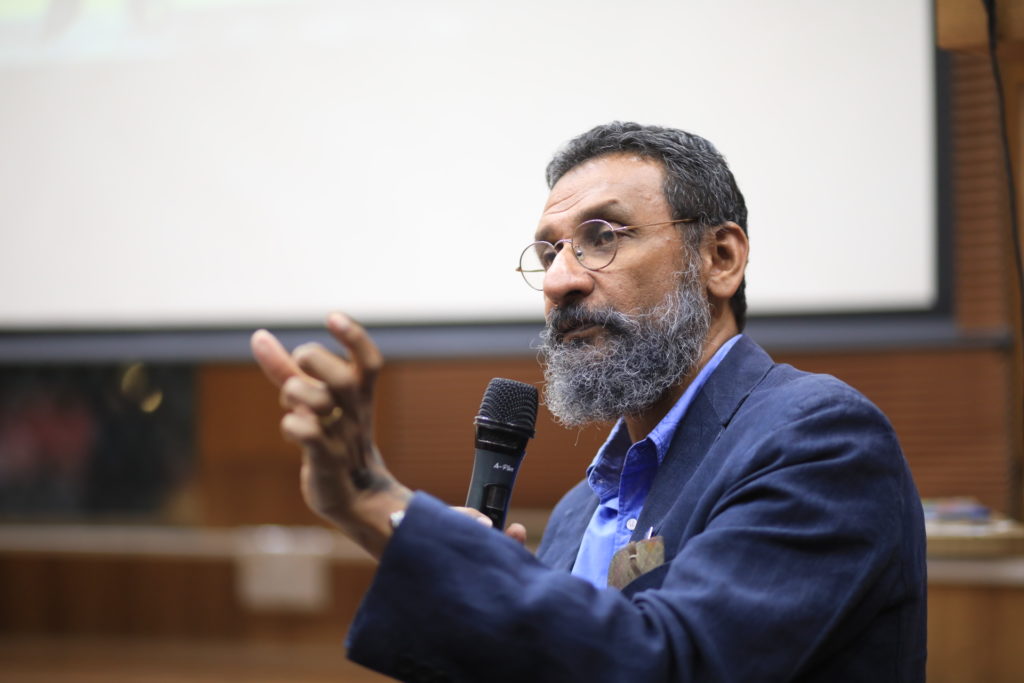Can learning be made fun and experiential? In UNESCO Mahatma Gandhi Institute of Education for Peace and Sustainable Development (MGIEP)’s Seventh Distinguished Lecture held at the UNESCO New Delhi, India on Thursday, June 28th, 2018, Zigor Hernandorena Juarros, Senior Project Manager – Fun Learning Department, Ubisoft (makers of Assassins Creed Franchise, The Division, Far Cry, Watch Dog), discussed how digital pedagogies such as games can be used as an effective tool to impart learning. The lecture was attended by over a hundred participants including teachers, educators, curriculum designers, ed-tech experts, games designers and developers as well as students.
In his lecture, titled ‘Learn to play and play to learn, the role of gaming in education’, Zigor explained how digital games can be designed to reward players, acknowledge practice and incremental progress, thus making learning more effective through peer-collaboration and a project-based approach. Zigor also underlined the need to develop suitable content for games to make them more relevant to 21st century learners. He expressed “Regular games (not meant for learning) very effectively teach the player everything they need in order to play the game. The same games can serve as effective tools for learning skills for the 21st century if used in the classroom as supplementary material.”
Preceding Zigor’s lecture, Dr. Anantha Duraiappah, Director, UNESCO MGIEP, highlighted that a key focus area for the Institute is to use digital pedagogies as an immersive, fun, interactive and experiential way of learning. He went on to express “Technology is disrupting our way of life at an unprecedented pace and education systems are no exception. There are bound to be major changes in the way teachers facilitate, deliver and assess learning. There are currently approximately over 2.5 billion people across the world who play digital games today across multiple platforms – and this number is increasing rapidly. The games for learning project at UNESCO MGIEP focuses on building tools and research on using games as a pedagogy to building 21st century skills and socio-emotional skills.” Further, he invited participants to “make learning addictive.”
The lecture was followed by a highly engaging discussion between Zigor and the audience on the potential of games for education and learning and mainstreaming digital technologies in education systems.
The lecture was hosted by UNESCO MGIEP as part of ‘The Distinguished Lecture Series’, inviting speakers of global eminence to spark transformative ideas for a shared future. Previous lecturers include: Ms. Tawakkol Karman (Nobel Laureate 2011); Dr. Scilla Elworthy; Prof. Sugata Mitra; Prof. Martha Nussbaum; Madame Irina Bokova; Prof. KP Mohanan and Sir Partha Dasgupta.
About the Speaker
 Zigor is an expert on games for learning and Senior Project Manager of the Fun Learning department at Ubisoft. His role entails developing games that will provide the player with actionable knowledge and expertise. In his previous roles, Zigor has delved into technology, business and creative arts with equal ease. He has spent considerable time working with tech giants such Apple and Handspring and also spent a decade as Art Director at Jeune Afrique, a French publishing group.
Zigor is an expert on games for learning and Senior Project Manager of the Fun Learning department at Ubisoft. His role entails developing games that will provide the player with actionable knowledge and expertise. In his previous roles, Zigor has delved into technology, business and creative arts with equal ease. He has spent considerable time working with tech giants such Apple and Handspring and also spent a decade as Art Director at Jeune Afrique, a French publishing group.
About UNESCO MGIEP
The UNESCO Mahatma Gandhi Institute of Education for Peace and Sustainable Development (MGIEP) is UNESCO’s category 1 Research Institute that focuses on Sustainable Development Goal (SDG) 4.7 towards education for building peaceful and sustainable societies across the world. In line with its vision of ‘Transforming Education for Humanity’, the Institute employs the whole-brain approach to education, with programmes that are designed to mainstream Socio-Emotional Learning in education systems, innovate digital pedagogies and to put youth as global citizens at the centre of the 2030 Agenda for Sustainable Development.


